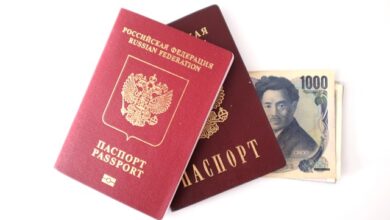Common Reasons for Visa Rejection and How to Appeal

Applying for a visa can be a stressful process, especially when there’s uncertainty about whether your application will be approved. Unfortunately, visa rejections are not uncommon, and they can happen for a variety of reasons. However, understanding the common causes of visa denials and knowing how to appeal or reapply can significantly improve your chances of success in the future.
Common Reasons for Visa Rejection
1. Incomplete or Incorrect Documentation
- Why It Happens : Missing documents, incomplete forms, or errors in your application can lead to an automatic rejection.
- How to Avoid It : Double-check all required documents before submission. Ensure that your forms are filled out accurately and completely. If you’re unsure about any part of the application, consult the embassy or consulate’s website or seek legal advice.
2. Insufficient Financial Proof
- Why It Happens : Many visas require proof that you can financially support yourself during your stay (e.g., bank statements, sponsorship letters). If the financial evidence is weak or unclear, your application may be denied.
- How to Avoid It : Provide comprehensive financial documentation, including recent bank statements, pay slips, tax returns, or a letter from your sponsor. Make sure the funds meet or exceed the minimum requirements set by the country.
3. Failure to Meet Eligibility Criteria
- Why It Happens : Each visa type has specific eligibility requirements (e.g., work experience, qualifications, language proficiency). Failing to meet these criteria will result in rejection.
- How to Avoid It : Carefully review the visa requirements and ensure you qualify before applying. If necessary, take steps to fulfill any missing prerequisites, such as improving your language skills or gaining additional qualifications.
4. Lack of Genuine Intent
- Why It Happens : For tourist, student, or temporary visas, authorities want assurance that you intend to leave the country after your stay. If they suspect you might overstay or misuse the visa, your application could be rejected.
- How to Avoid It : Provide strong ties to your home country, such as property ownership, family obligations, or employment commitments. Clearly outline your travel plans and purpose for visiting.
5. Criminal Record or Security Concerns
- Why It Happens : A criminal record or involvement in activities deemed a security risk can disqualify you from obtaining a visa.
- How to Avoid It : Be honest about your background. If you have a minor offense, provide context and evidence of rehabilitation. In serious cases, consult an immigration lawyer for guidance.
6. Previous Visa Violations
- Why It Happens : Overstaying a previous visa, working without authorization, or violating visa conditions can lead to future rejections.
- How to Avoid It : Address past violations honestly and explain what measures you’ve taken to comply with immigration laws since then.
7. Inadequate Travel Insurance
- Why It Happens : Some countries require proof of adequate health insurance coverage for the duration of your stay. Without it, your application may be denied.
- How to Avoid It : Purchase a policy that meets the specific requirements of the destination country and submit the relevant documentation.
8. Interview Performance
- Why It Happens : During visa interviews, inconsistencies in your answers, lack of preparation, or poor communication can raise doubts about your intentions.
- How to Avoid It : Practice answering potential interview questions, maintain honesty, and demonstrate confidence in your responses. Bring supporting documents to back up your claims.
How to Appeal a Visa Rejection
If your visa application is rejected, don’t panic—many countries offer an appeals process. Here’s how to navigate it effectively:
1. Understand the Reason for Rejection
- Most embassies or consulates will provide a written explanation of why your visa was denied. Review this carefully to identify the issue(s).
- Common reasons include insufficient documentation, failure to meet eligibility criteria, or doubts about your intent to return home.
2. Request a Reconsideration or Appeal
- Check the Appeals Process : Different countries have different procedures for appealing visa decisions. Visit the official website of the embassy or consulate to learn about their specific process.
- Submit a Formal Appeal : Write a formal letter requesting reconsideration of your case. Include:
- A clear statement of your intent to appeal.
- Supporting documents addressing the reason(s) for rejection.
- Any new information or clarifications that strengthen your case.
3. Provide Additional Evidence
- Gather supplementary documentation to address the grounds for rejection. For example:
- If financial proof was insufficient, provide updated bank statements or a sponsorship letter.
- If your intent to return home was questioned, include stronger ties to your home country (e.g., property deeds, job contracts).
4. Seek Legal Assistance
- If the appeals process seems complex or if your case involves significant issues (e.g., prior visa violations), consider hiring an immigration lawyer. They can help you prepare a compelling appeal and represent you if needed.
5. Attend a Hearing (if applicable)
- Some countries require applicants to attend a hearing as part of the appeals process. Prepare thoroughly by reviewing your case, gathering evidence, and practicing your presentation.
6. Reapply After Addressing Issues
- If your appeal is unsuccessful or if no appeals process exists, you can reapply once you’ve resolved the issues that led to the rejection. Ensure your new application addresses all previous shortcomings.
Tips for Success When Appealing or Reapplying
- Act Quickly : Submit your appeal or gather materials for reapplication promptly to avoid delays.
- Be Honest and Transparent : Misrepresentation or withholding information can worsen your situation.
- Highlight Changes : Emphasize any positive changes since your initial application (e.g., improved finances, completed qualifications).
- Follow Instructions Carefully : Adhere strictly to the guidelines provided by the embassy or consulate.
- Stay Calm and Professional : Maintain a respectful tone in all communications, even if you disagree with the decision.



